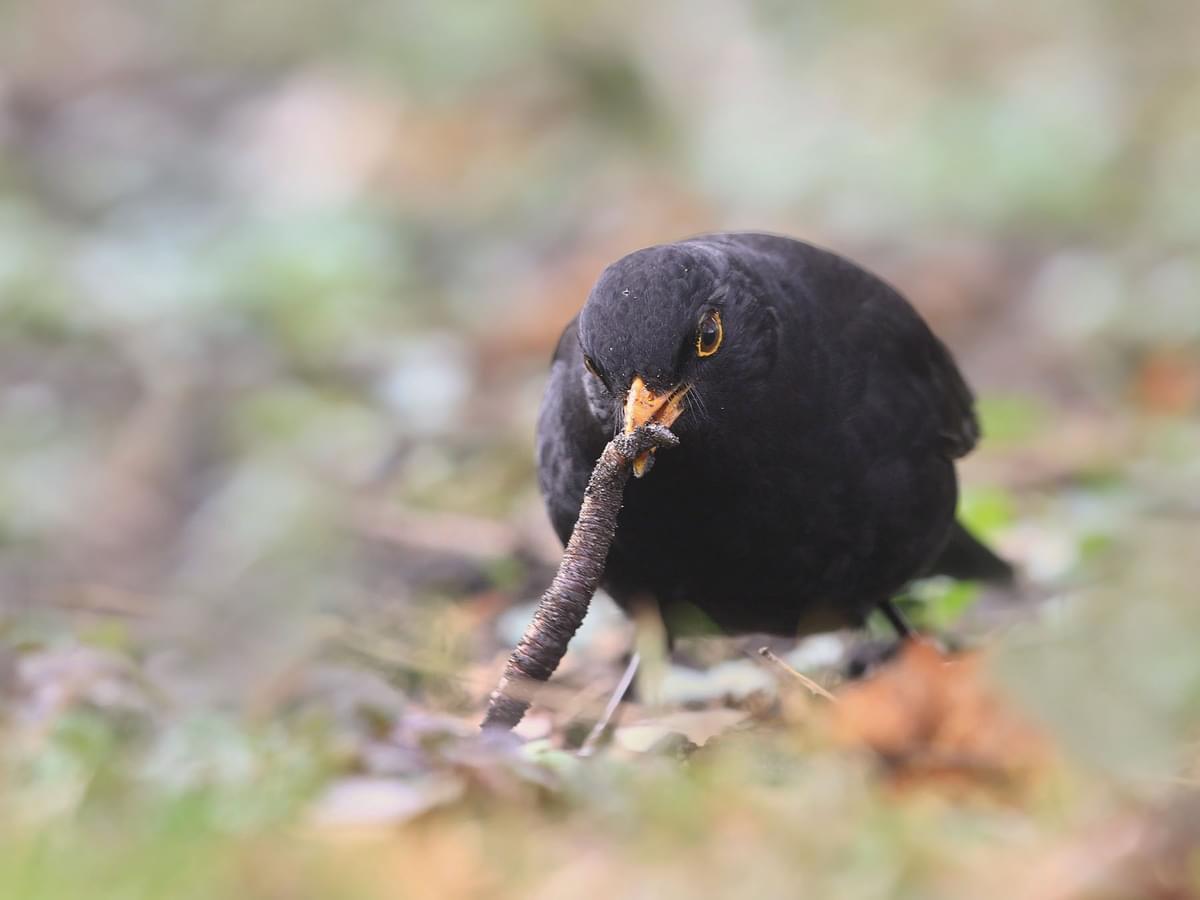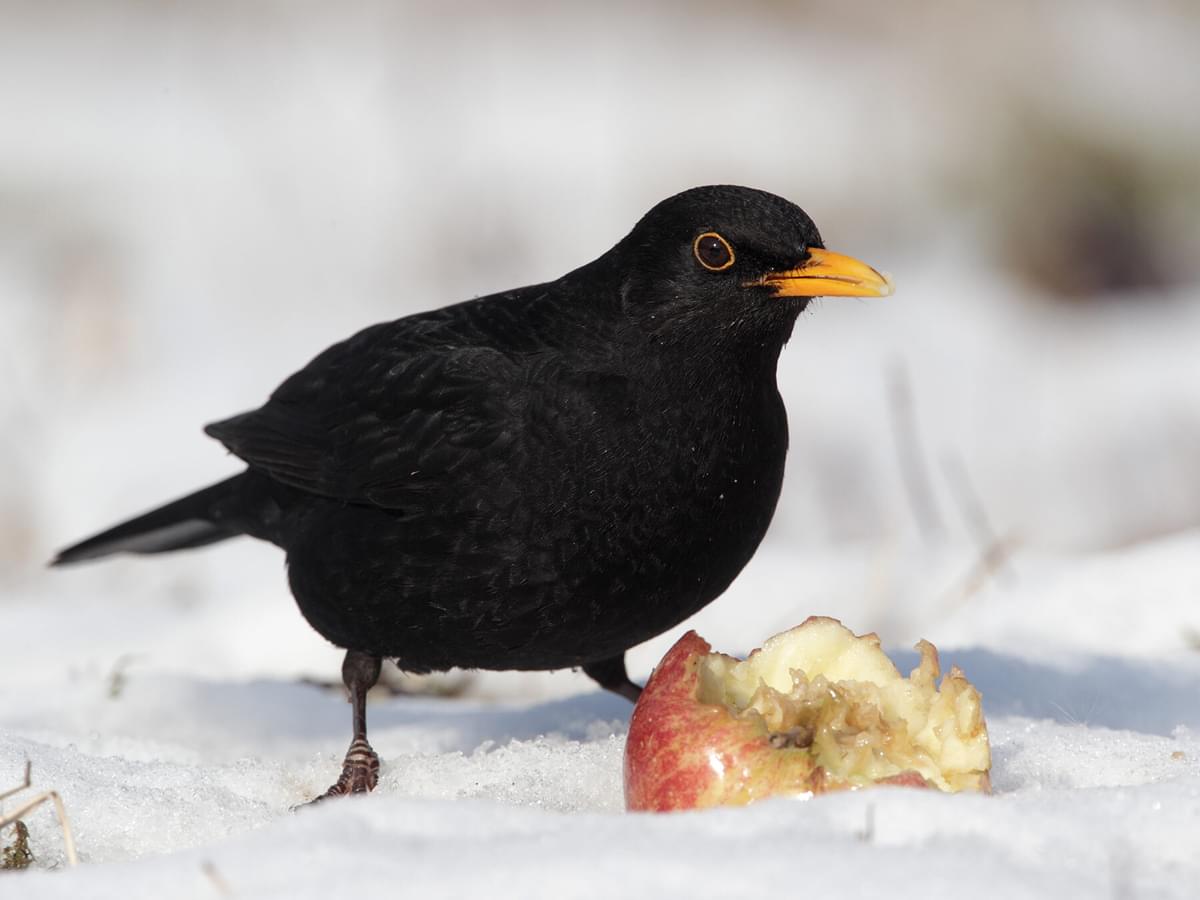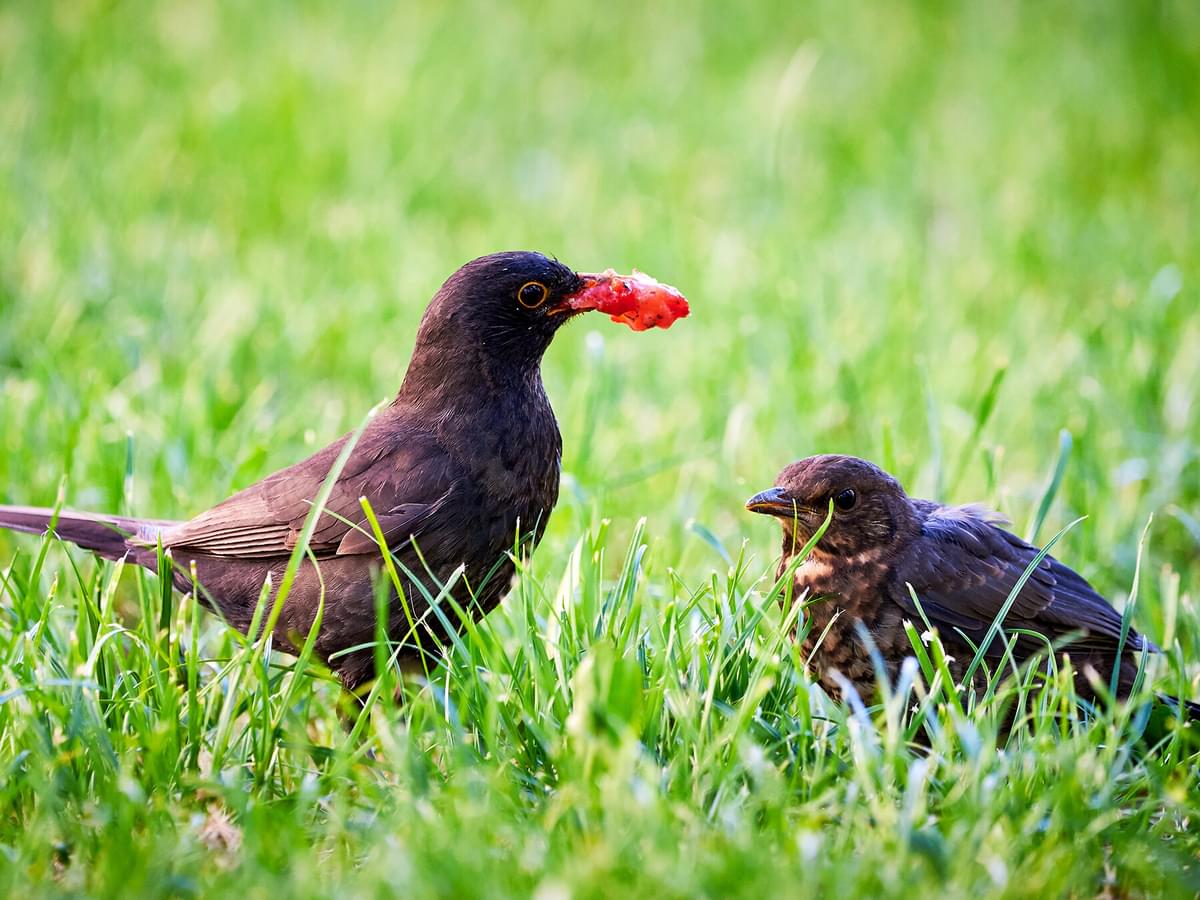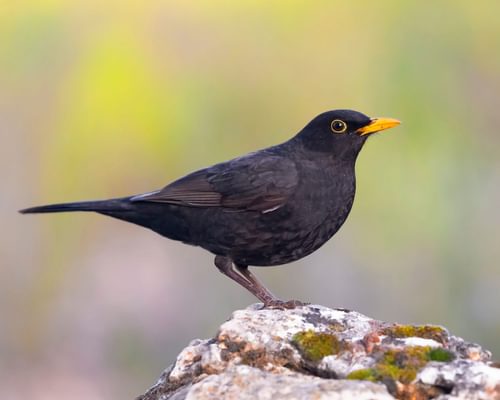From juicy earthworms in summer to vibrant berries in winter, the blackbird's adaptive diet helps explain why this songbird thrives in environments from ancient woodlands to modern city parks.
Blackbird Diet Basics
Blackbirds are opportunistic omnivores with a diet that changes significantly throughout the year. These glossy black birds (females are actually brown) consume a wide variety of foods, adapting their feeding habits to whatever is seasonally abundant.
During spring and summer, blackbirds feed predominantly on protein-rich animal matter. Earthworms form a substantial part of their warm-season diet, alongside beetles, caterpillars, spiders, snails, and slugs. After rainfall, blackbirds become particularly active on lawns, extracting worms that come closer to the surface in wet conditions.
In autumn and winter, their diet shifts dramatically toward plant matter. Berries and fruits can make up over 60% of a blackbird's diet during colder months. They eagerly consume rowan berries, hawthorn, holly, ivy, apples, and other fruits that remain available through winter.

Blackbird with a beak full of mealworms
How Blackbirds Hunt for Food
Blackbirds employ fascinating techniques when searching for food. When hunting on lawns or in leaf litter, they exhibit a distinctive run-stop-run pattern.
During the "stop" phase, they often tilt their head to one side, directing an eye downward toward the soil. This behaviour isn't just for show – blackbirds are actually listening for the subtle movements of worms or insects beneath the surface.
Once prey is detected, blackbirds use their sharp bills to probe precisely into the soil, extracting worms with remarkable accuracy. They can frequently be observed tugging persistently at a partially exposed worm, engaging in a brief tug-of-war before the earthworm relents.
Another common feeding behaviour involves systematically turning over fallen leaves with their bills and checking underneath for hidden invertebrates. This methodical approach ensures they locate food sources that remain invisible to less thorough foragers.

Close up of a Blackbird pulling a worm out of the ground
Seasonal Changes in Blackbird Diets
Blackbird feeding habits follow a clear seasonal pattern:
Spring: As soil temperatures rise, earthworms become more active near the surface. Blackbirds capitalise on this abundance, spending hours probing lawns and soil. They also consume many insects feeding on fresh spring growth.
Summer: Invertebrates remain the primary food source, with parents particularly focused on gathering protein-rich items for hungry nestlings. Adult blackbirds have been observed selectively choosing larger insects and worms when feeding young, even when their own diet includes berries.
Autumn: As invertebrates become less available, blackbirds turn their attention to the fruit bounty. They systematically strip berries from rowan trees, hawthorn bushes, and other fruiting plants. During this season, blackbirds sometimes cache (store) food items for later retrieval when conditions worsen.
Winter: The coldest months present the greatest challenge. Blackbirds become highly opportunistic, taking advantage of fallen apples, persistent berries like holly and ivy, and bird feeders in gardens. They continue searching for invertebrates in sheltered areas where the ground remains unfrozen.

Common Blackbird eating rowan berries
Daily Feeding Patterns
Blackbirds follow distinct feeding patterns throughout the day:
Dawn feeding: Blackbirds are among the earliest birds to begin foraging, often starting at first light. This early morning period is particularly productive for worm hunting, as earthworms are typically more active near the soil surface during dawn hours.
Mid-morning activity: After the initial dawn feeding burst, blackbirds continue foraging through mid-morning, gradually becoming less active as temperatures rise.
Afternoon lull: During mid-day, especially on hot summer days, blackbirds often reduce their feeding activity, sometimes seeking shade and conserving energy.
Evening resurgence: A second major feeding period occurs in the late afternoon and evening hours before sunset. This allows blackbirds to build up energy reserves to sustain them through the night.
Dusk finale: Just before darkness falls, blackbirds often engage in a final intensive feeding session, particularly focused on high-energy foods.
Weather conditions can significantly alter these patterns. Rainy periods trigger increased feeding activity regardless of the time of day, as precipitation brings worms closer to the surface.

Blackbird in the winter snow
Blackbirds in the Garden
Garden owners often develop a special relationship with their local blackbirds, which quickly learn where food is available. These intelligent birds frequently follow gardeners who are digging or moving mulch, darting in surprisingly close to snatch exposed worms and insects.
To attract and support blackbirds in your garden, consider offering:
- Mealworms (dried or live) scattered on the ground or a feeding tray
- Fallen fruit left in place rather than cleared away
- Halved apples placed on the ground
- Berry-producing shrubs like rowan, hawthorn, and holly
- A consistent water source, especially during dry periods
Blackbirds prefer feeding on the ground or from low platforms rather than hanging feeders. They also appreciate soft fruits that have fallen, as they can't easily peck through tough skins.

Blackbird foraging in the grass
Blackbird Feeding Behaviors to Watch For
When observing blackbirds feeding, look for these distinctive behaviours:
Head-tilting: The sudden freeze and head-tilt indicate a blackbird is listening for underground movement. They can detect prey moving several centimetres below the surface.
Bill-wiping: After consuming berries with sticky juices, blackbirds rapidly wipe their bills on branches or other surfaces to clean them.
Ground-scratching: Unlike some birds that scratch with one foot at a time, blackbirds sometimes use a distinctive backward hop-and-scratch motion with both feet to expose food in leaf litter.
Berry manipulation: Watch how blackbirds handle larger berries, often rotating them in their bill before swallowing them whole.

Common Blackbird eating an apple off the ground
Benefits to Gardeners
Blackbirds provide valuable services to gardeners by consuming many pest species. Their diet includes slugs, snails, leatherjackets (crane fly larvae that damage lawns), and various caterpillars that might otherwise damage garden plants. This natural pest control comes with the added bonus of beautiful dawn and dusk songs.
Common Misconceptions
Many people assume blackbirds primarily eat worms, but their diet is far more diverse. Depending on the season, fruits and berries can actually comprise the majority of what they consume.
Another misconception is that blackbirds damage fruit crops. While they do eat berries and fruits, they typically focus on naturally falling fruits or wild species rather than causing significant damage to cultivated crops.

Male blackbird feeding a young fledgling a strawberry
Final Thoughts
The blackbird's varied diet demonstrates remarkable adaptability, allowing these birds to thrive across diverse habitats, from rural woodlands to urban parks.
By understanding what blackbirds eat throughout the seasons, you can better appreciate their behaviour in your garden and potentially provide supplementary food during challenging periods.
Whether they're methodically hunting worms on your lawn or stripping berries from a shrub, blackbirds offer fascinating insights into the feeding strategies that have made them one of Europe's most successful and beloved garden birds.

Male and female blackbirds at a garden feeder

